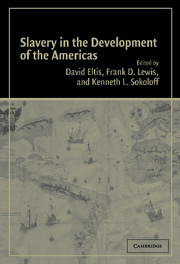Book contents
- Frontmatter
- Contents
- Appreciation: Stanley L. Engerman and Slavery
- Introduction
- PART I ESTABLISHING THE SYSTEM
- PART II PATTERNS OF SLAVE USE
- PART III PRODUCTIVITY CHANGE AND ITS IMPLICATIONS
- PART IV IMPLICATIONS FOR DISTRIBUTION AND GROWTH
- 9 Wealth Accumulation in Virginia in the Century before the Civil War
- 10 The Poor: Slaves in Early America
- 11 The North–South Wage Gap before and after the Civil War
- The Writings of Stanley L. Engerman
- Contributors
- Index
10 - The Poor: Slaves in Early America
Published online by Cambridge University Press: 18 August 2009
- Frontmatter
- Contents
- Appreciation: Stanley L. Engerman and Slavery
- Introduction
- PART I ESTABLISHING THE SYSTEM
- PART II PATTERNS OF SLAVE USE
- PART III PRODUCTIVITY CHANGE AND ITS IMPLICATIONS
- PART IV IMPLICATIONS FOR DISTRIBUTION AND GROWTH
- 9 Wealth Accumulation in Virginia in the Century before the Civil War
- 10 The Poor: Slaves in Early America
- 11 The North–South Wage Gap before and after the Civil War
- The Writings of Stanley L. Engerman
- Contributors
- Index
Summary
In most early American societies slaves were the poor. This claim would not be true if the poor are defined as only those meriting charity, those unable to sustain themselves, “the impotent poor” or “dependent poor,” to use early modern terminology. But if living from hand to mouth, toiling manually for survival, and leading a precarious and tenuous existence define the able-bodied, the “labouring poor” (a term apparently coined by Daniel Defoe in 1701), then slaves pre-eminently qualify. They worked without remuneration, legally owned no property, suffered often arbitrary and excessive punishment, and lived at minimal subsistence levels. They were as poor as it is possible to be, a truly impoverished people, suffering in Orlando Patterson's phrase “social death.” As Edmund Morgan noted of Virginia, but by implication of much of early America, “Slavery, more effectively than the Elizabethan Statute of Artificers, made the master responsible for the workman and relieved society at large of most of its restive poor.” Slaves composed the majority of the able-bodied poor in a colony such as Virginia. Virginia's metamorphosis into a slave society also transferred the responsibility for the aged, the disabled, and the young – the dependent poor – from the parish to the individual plantation owner. In a sense, then, slavery “solved” the problem of the poor, whether dependent or able-bodied, by privatizing it.
Distinguishing between the dependent (deserving) and the able-bodied (undeserving) is one useful historical way to think about the poor, but conceptions of poverty are not straightforward.
- Type
- Chapter
- Information
- Slavery in the Development of the Americas , pp. 288 - 323Publisher: Cambridge University PressPrint publication year: 2004
- 1
- Cited by

